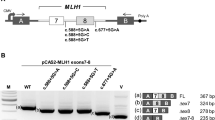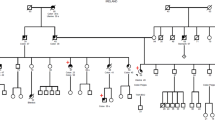Abstract
The PMS2 gene is one of the DNA mismatch repair genes (MMR) implicated in Lynch syndrome (LS). A subset of PMS2 pathogenic variants (PVs) are splice variants mostly affecting canonical GT/AG splicing sequences. However, the majority of the intronic variants outside canonical splice sites remained as variants of unknown significance, even though some of them would alter the splicing process. In this report, we describe the analysis of such an intronic variant (c.251-5T > C) detected in an 82-year-old patient diagnosed with endometrial cancer displaying microsatellite instability and the loss of PMS2 expression displayed. RNA analysis demonstrated that this variant lead to the complete exon 4 skipping, resulting in the synthesis of a truncated protein. This finding shows the relevance of functional RNA analysis in the non-canonical intronic variant assessment and the importance of systematic evaluation of MSI/loss of expression of MMR genes for LS screening in patients with endometrial cancers.


Similar content being viewed by others
References
Lynch HT, Snyder CL, Shaw TG et al (2015) Milestones of Lynch syndrome: 1895–2015. Nat Rev Cancer 15:181–194. https://doi.org/10.1038/nrc3878
Aaltonen LA, Peltomäki P, Mecklin JP et al (1994) Replication errors in benign and malignant tumors from hereditary nonpolyposis colorectal cancer patients. Cancer Res 54:1645–1648
Win AK, Jenkins MA, Dowty JG et al (2017) Prevalence and penetrance of major genes and polygenes for Colorectal Cancer. Cancer Epidemiol Biomarkers Prev 26:404–412. https://doi.org/10.1158/1055-9965.EPI-16-0693
Wang Q, Leclerc J, Bougeard G et al (2020) Characterisation of heterozygous PMS2 variants in french patients with Lynch syndrome. J Med Genet 57:487–499. https://doi.org/10.1136/jmedgenet-2019-106256
Richards S, Aziz N, Bale S et al (2015) Standards and guidelines for the interpretation of sequence variants: a joint consensus recommendation of the American College of Medical Genetics and Genomics and the Association for Molecular Pathology. Genet Med 17:405–424. https://doi.org/10.1038/gim.2015.30
Karam R, Conner B, LaDuca H et al (2019) Assessment of Diagnostic Outcomes of RNA genetic testing for Hereditary Cancer. JAMA Netw Open 2:e1913900. https://doi.org/10.1001/jamanetworkopen.2019.13900
Borràs E, Pineda M, Cadiñanos J et al (2013) Refining the role of PMS2 in Lynch syndrome: germline mutational analysis improved by comprehensive assessment of variants. J Med Genet 50:552–563. https://doi.org/10.1136/jmedgenet-2012-101511
Okkels H, Lagerstedt-Robinsson K, Wikman FP et al (2019) Detection of PMS2 mutations by Screening Hereditary nonpolyposis Colon cancer families from Denmark and Sweden. Genet Test Mol Biomarkers 23:688–695. https://doi.org/10.1089/gtmb.2018.0316
Jin Z, Sinicrope FA (2022) Mismatch repair-deficient Colorectal Cancer: building on checkpoint blockade. J Clin Oncol JCO2102691. https://doi.org/10.1200/JCO.21.02691
Assessment of MMR Tumor Status - Summary- (2021) https://www.e-cancer.fr/Expertises-et-publications/Catalogue-des-publications/Evaluation-du-statut-MMR-tumoral-synthese-2021. Accessed 25 May 2022
Ten Broeke SW, van der Klift HM, Tops CMJ et al (2018) Cancer Risks for PMS2-Associated Lynch Syndrome. J Clin Oncol 36:2961–2968. https://doi.org/10.1200/JCO.2018.78.4777
Coffin E, Dhooge M, Abou Ali E et al (2019) [Identification and management of patients with Lynch syndrome]. Presse Med 48:904–914. https://doi.org/10.1016/j.lpm.2019.07.011
Acknowledgements
We thank patient and families for their contribution to this work and Brigitte Manship for critical proofreading.
There was no specific grant supporting this work.
Author information
Authors and Affiliations
Corresponding author
Ethics declarations
Statements and declarations
The authors have no relevant financial or non-financial interests to disclose.
Additional information
Publisher’s note
Springer Nature remains neutral with regard to jurisdictional claims in published maps and institutional affiliations.
Rights and permissions
Springer Nature or its licensor (e.g. a society or other partner) holds exclusive rights to this article under a publishing agreement with the author(s) or other rightsholder(s); author self-archiving of the accepted manuscript version of this article is solely governed by the terms of such publishing agreement and applicable law.
About this article
Cite this article
Bouras, A., Naibo, P., Legrand, C. et al. A PMS2 non-canonical splicing site variant leads to aberrant splicing in a patient suspected for lynch syndrome. Familial Cancer 22, 303–306 (2023). https://doi.org/10.1007/s10689-022-00323-y
Received:
Accepted:
Published:
Issue Date:
DOI: https://doi.org/10.1007/s10689-022-00323-y




